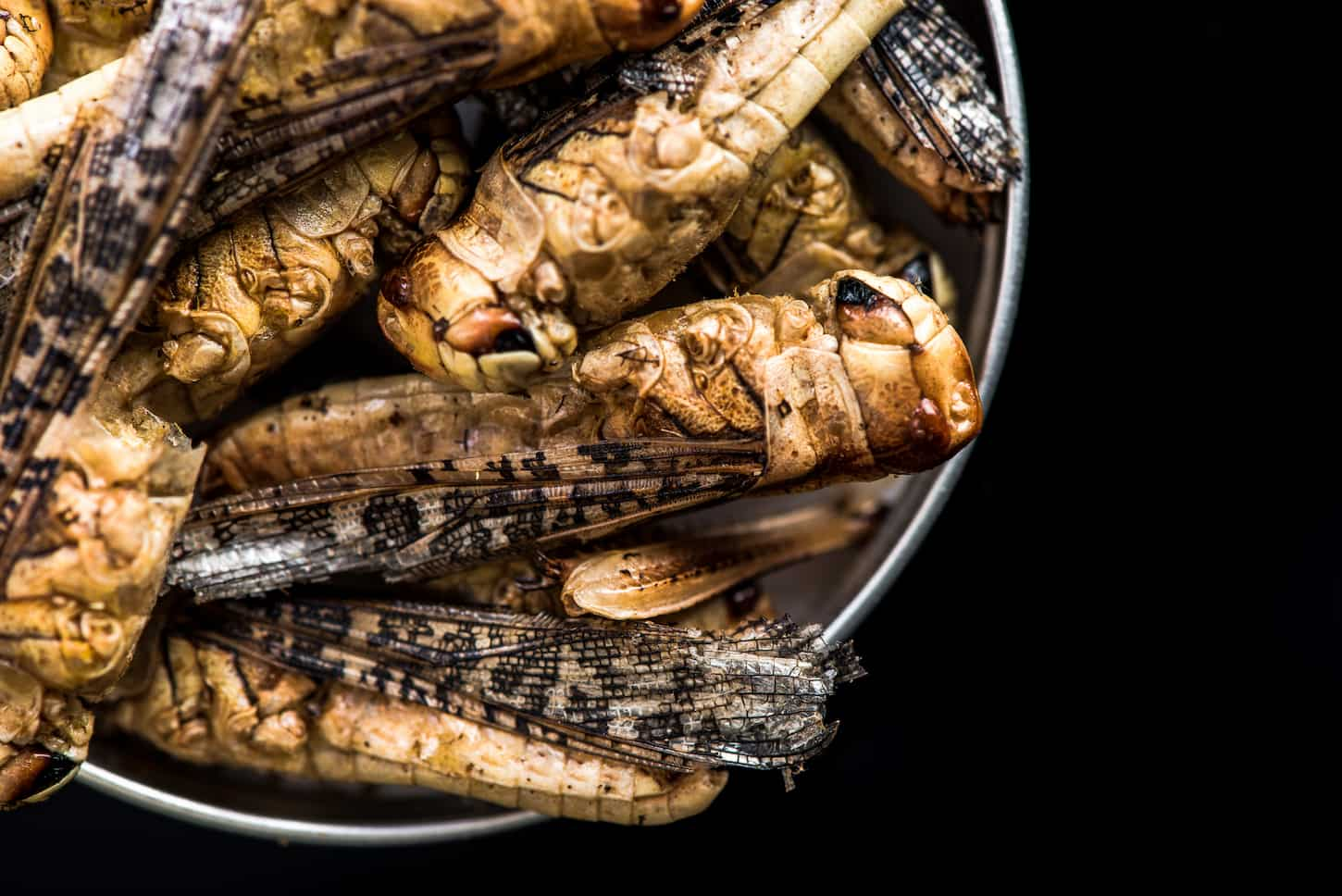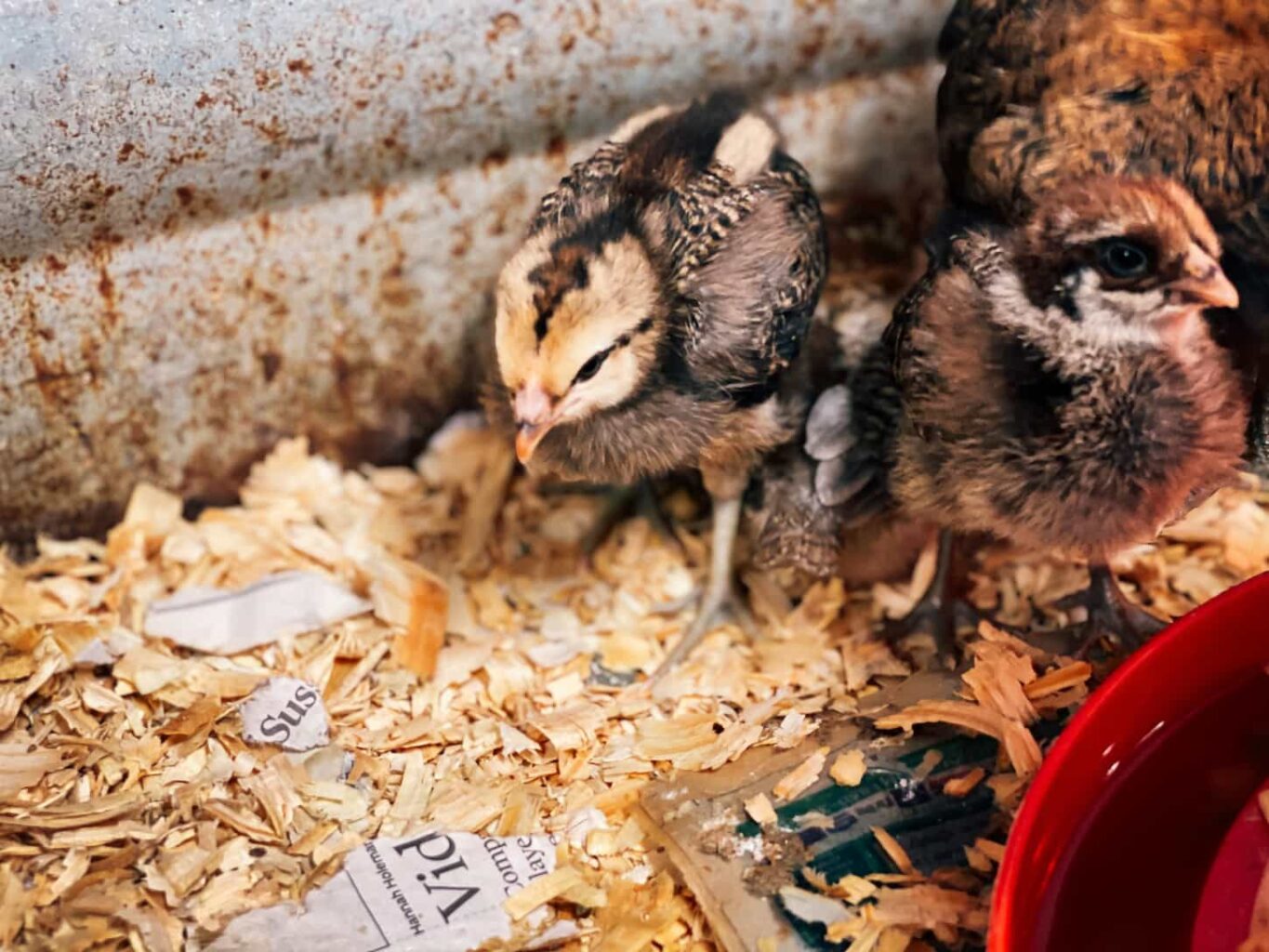Chickens are omnivores and can eat most meats, vegetables, fruits, and a wide variety of insects. But what about freeze-dried insects – can chickens eat them safely?
Chickens can eat freeze-dried insects as long as they have been properly freeze-dried and are from reliable sources. Just like live insects, the freeze-dried varieties are packed with protein and other nutrients.
Chickens are the most important domesticated animals on earth that are raised for food. They need to be fed a large amount of food to be healthy.
Let’s find out together what kinds of freeze-dried insects are best for our feathered friends, and why the freeze-drying technique is better than using a conventional dryer.

Freeze-Dried Insects vs. Conventionally Dried Insects
Insects are an excellent source of protein and they are a great supplement to a chicken’s diet. Chickens enjoy eating bugs and insects, whether by catching them or being fed.
For the rest of the article to make the most sense, though, we need to take a step back and explain a little bit about the difference between how the insects are prepared. And to do that, we also need to cover some basics about drying and freeze-drying.
Freeze-drying is a process where the structure, nutritional value, taste, and color of the insect are kept intact. Insects are dried at a very low temperature, which allows their inner structure to stay put.
Essential nutrients like proteins, carbohydrates, fat, and vitamins remain fully present, provided they are adequately stored in a dry place.
Conventional drying is a process where the insects are dried by warm air. During this process, insects lose essential nutrients, taste, and color.
Almost all insects are hollow in structure. This happens because the insects were exposed to high heat.
The benefits of freeze-dried insects are:
- High protein content
- High nutritional value
- Long shelf life
- Color and taste are preserved
- Great dietary supplement
The main difference between “fresh” bugs and dried (or freeze-dried) insects is the water content. Because fresh bugs still have all that water, their overall macronutrient content is higher than fresh ones.
This translates into two important things.
- Chickens should generally eat fewer dried or freeze-dried bugs than fresh ones.
- Chickens who are given dried (or freeze-dried) insects should have access to plenty of clean, fresh, drinking water.
Can Chickens Eat Freeze-Dried Crickets?
Chickens eat crickets and enjoy them whether they are alive or freeze-dried. Freeze-dried crickets are rich in essential nutrients that chickens need to thrive. Crickets are a great treat for chickens and are packed with protein, vitamins, and minerals.
Check out what a terrific source of nutrition they are:
- They are packed with B vitamins, especially B12.
- They are a complete protein which means they have all nine essential amino acids.
- They have more calcium than milk.
- They have anti-oxidant qualities.
- Compared to beef, they have over three times the amount of iron and over five times the amount of magnesium.
- They are high in zinc.
Why is this important? All of these minerals and vitamins are significant for successful egg production and a strong immune system for chickens.
If you’re living in an area where there are no crickets, then freeze-dried insects are a great substitute – and they have a long shelf life too.
If chickens eat too many crickets, they can develop digestive problems. Feed chickens a couple of crickets per day and they should be fine.
Another important thing to remember is to buy freeze-dried crickets from reliable sources. Crickets carry disease, so always make sure they are produced in a controlled environment.
Can Chickens Eat Freeze-Dried Mealworms?
Chickens find mealworms irresistible. Freeze-dried mealworms provide a high-protein treat for chickens. Like any freeze-dried insect, they have a long shelf life so the chickens can be fed all year round.
Chickens will eat mealworms anytime – they simply love them. And why wouldn’t they?
Like many other insects, mealworms are packed with protein, minerals, and vitamins. Technically mealworms are not worms.
Mealworms are the larvae of the darkling beetle. If the idea of raising your own mealworms is not attractive, then chickens will eat freeze-dried mealworms without a second thought.
Fresh or freeze-dried mealworms are very healthy for chickens, but only in moderation. Mealworms should be considered as treats and an additional supplement to the chicken’s diet.
About four freeze-dried mealworms per day are enough for one chicken. You can read why that is in my article here: Complete Guide to Chickens and Mealworms.
When it comes to mealworms, they are two sides of the same coin. Though it may seem unusual, mealworms are illegal in the UK. Let’s discover why.
Why are mealworms illegal in the UK?
Buying mealworms to feed chickens is illegal in the UK. Most of the mealworms are imported, and often carry some kind of disease. This rule applies not only to mealworms but all commercially generated insect proteins.
This regulation may seem very strange because what if a chicken finds them in the yard and eats them? Will the owner of the chicken be arrested? We assure you, the answer is no.
Feeding mealworms to chickens is illegal in the UK and unsafe, because of the health risks to chickens and to the people who consume the eggs and meat.
Is it safe to feed mealworms to chickens in the US?
It’s safe to feed mealworms to chickens in the US. In the US, mealworms are legal, so no worries there. Mealworms are good for chickens, the UK measure is a precaution to prevent any possible diseases.
We advise our readers that when in doubt, always check out the food regulations in your country.
I’m located in the USA, so I follow the rules here. However, it’s good to know the guidelines and regulations of other countries, because they can give us additional insights into how we want to do things.
Since discovering the rationale for the UK’s ban on mealworms, I’ve definitely become pickier about the ones I’ll buy for my chickens. I even bought a worm farm so I can have better quality control over the insects I feed my chickens.
Not that I can control what they catch and eat outside, mind you. Chickens are gonna catch and eat insects no matter what rules I make for them!
Can Chickens Eat Freeze-Dried Earthworms?
Earthworms are a very healthy treat for chickens. They are rich in minerals like iron, calcium, zinc, and manganese. Fresh or freeze-dried, earthworms are known as superfoods for chickens.
Chickens love eating earthworms, alive or freeze-dried! They are one of my chickens’ favorite treats, and that’s really true of all chickens.
Earthworms are packed with protein, fat, and minerals. During the freeze-drying process, all of these nutrients are preserved.
Earthworms are seasonal. In the winter, they go deep underground and hibernate. This makes it very difficult for chickens to reach them, so it’s always a good idea to have freeze-dried earthworms nearby, especially if you don’t have a worm farm indoors for year-round worms.
There is no limit to how many fresh or freeze-dried earthworms chickens can eat throughout the day. Chickens would have to eat around 100 earthworms per day to fulfill their protein requirements.
However, we don’t recommend a worm diet alone – chickens need a balanced diet in order to have a healthy life.
- You can read more about using worms as part of a chicken’s diet in our Complete Guide to Chickens and Worms.
- And you can read more about helping chickens have a balanced diet in my article How to Raise Chickens Without Feed (And Why it’s Better!)
Can Chickens Eat Freeze-Dried Grasshoppers?
Chickens adore eating grasshoppers fresh or freeze-dried. Freeze-dried grasshoppers contain protein and amino acids like cysteine, methionine, and lysine. Methionine plays an important role in a chicken’s growth. Grasshoppers are packed with vitamin A, which increases the quality of eggs.
Do chickens eat freeze-dried grasshoppers? You better believe it! For most people, the thought of eating grasshoppers is unpleasant. But to chickens, they represent a delicious meal.
Grasshoppers are a great addition to the chicken’s diet because they are low in fat. Although they are healthy, feed grasshoppers to chickens only once or twice a week.
Live grasshoppers can be harmful to chickens because they carry diseases. Freeze-dried grasshoppers are raised organically.
Nevertheless, when buying freeze-dried grasshoppers, always double-check the source.
Can Baby Chicks Eat Freeze-Dried Insects?
When it comes to freeze-dried insects, baby chicks can eat them when they are 10 days old. Make sure the insects are appropriately freeze-dried. Moderation is the keyword here. Baby chicks are cute but don’t overindulge them with treats.
Cute baby chicks are omnivores just like chickens. Right after hatching, they are self-sufficient. For the first two days, you don’t have to feed them at all.
They copy the mother hen and almost immediately start pecking. They start slowly eating small bugs and some greens. Baby chicks enjoy all insects but consider the portion sizes of their meals first. They have small bodies, so don’t feed them too much food.
It’s a good idea to crush the freeze-dried insect and mix it with chick feed. As a matter of fact, when giving them their first freeze-dried insect, prepare to witness the happiest baby chick ever!
One of the greatest joys for chickens is feeding time, and for us, it’s one of the most entertaining.
Wondering if you can Can You Overfeed Baby Chicks? I’ve done the research for you at that link.

Key Takeaways and Next Steps
One of our chicken’s favorite foods is insects – it doesn’t matter if they are alive, dried, or freeze-dried. They love almost all insects, crickets, grasshoppers, mealworms, spiders, maggots, earthworms, you name it.
Most insects don’t look very good to us, but from the chickens’ perspective, they are the best kind of food. The truth is, chickens can’t control themselves around insects, live or freeze-dried. Chickens enjoy food a great deal, especially insects.
Freeze-dried insects are a great substitute for live ones. Due to the freeze-drying process, all the nutrients are intact. There are many benefits of feeding chickens with insects in general.
Today, unfortunately, many chicken diets don’t include insects. They are the best source of protein and other nutrients. Freeze-dried insects are safe for the chickens and will improve their overall health and help egg production.
We also learned that insects can carry diseases. In that case, freeze-dried insects may be a better choice, although freeze-drying doesn’t kill every pathogen (that link will take you to an article where I explain what pathogens can be controlled with freeze-drying).
This does not mean you shouldn’t let your chickens eat live insects, in fact, under most circumstances live insects are fine.
Remember the proverb: “An egg a day keeps the doctor away!“ Okay, fine. It’s apples. Whatever. Science can’t decide if eggs are evil or angelic, so I’ll just keep focusing on moderation.
And again, if you’re wanting to focus on healthy eating and moderation for your chicken flock, make sure you read my article on how to do so here.
Due to all the insects that our chickens eat, their eggs are full of protein and very healthy for us!
Resources
Learning from your own experience is essential, but learning from others is also intelligent. These are the sources used in this article and our research to be more informed as homesteaders.
- April. “Can Baby Chicks Eat Crickets?” The Hip Chick, 23 Apr. 2022, thehipchick.com/can-baby-chicks-eat-crickets.
- Armitage, Neil. “Earthworms for Chickens.” Cluckin, 15 Nov. 2021, cluckin.net/earthworms-for-chickens.html.
- Coppa, Christine. “Here’s What to Feed—and Not Feed—Chickens.” Country Living, 1 Aug. 2016, www.countryliving.com/life/kids-pets/news/a39370/what-to-feed-chickens.
- “Freeze-Dried Insects – Insects Alive, Freeze-Dried and Deep Frozen.” Krecafeed.Com, www.krecafeed.com/webshop/details/?webgroupfilter=4&artdetail=13960. Accessed 5 May 2022.
- “Including Earthworms in Organic Poultry Diets | eOrganic.” Eorganic.Org, eorganic.org/node/8103. Accessed 5 May 2022.
- Jeremy. “Can Chickens Eat Crickets? [Is This A Safe Insect To Feed?].” Pet Educate, 5 May 2022, peteducate.com/can-chickens-eat-crickets.
- Lee, April. “Do Chickens Eat Grasshoppers and Locusts?” Farmhouse Guide, 11 Oct. 2021, farmhouseguide.com/do-chickens-eat-grasshoppers-and-locusts.
- “Can I Feed My Chicks Frozen Bugs?” BackYard Chickens – Learn How to Raise Chickens, 26 June 2012, www.backyardchickens.com/threads/can-i-feed-my-chicks-frozen-bugs.681692.
- PetDietGuide. “Can Chickens Eat Crickets?” Pet Diet Guide, 11 Apr. 2022, petdietguide.com/can-chickens-eat-crickets.
- Phil. “Why Is It Illegal to Feed Chickens Mealworms in the UK?” Chicken & Chicks Info, 2 Dec. 2021, chickenandchicksinfo.com/why-is-it-illegal-to-feed-chickens-mealworms-in-the-uk.
- PremiumCrickets.com – Live Feeder Crickets Dubia Roaches Superworms Mealworms, Wax Worms and more Shipped fresh to your door! “Dry Roasted Crickets.” PremiumCrickets.Com – Live Feeder Crickets Dubia Roaches Superworms Mealworms, Wax Worms and More Shipped Fresh to Your Door!, www.premiumcrickets.com/products/freeze-dried-crickets__fdc.aspx. Accessed 5 May 2022.
- Sumi. “Topic of the Week – Feeding Mealworms, Bugs Etc.” BackYard Chickens – Learn How to Raise Chickens, 1 Aug. 2021, www.backyardchickens.com/threads/topic-of-the-week-feeding-mealworms-bugs-etc.1230024.
- Susan. “Can Chickens Eat Earthworms? Is It Safe or Toxic?” Henraising.Com, 28 Dec. 2020, henraising.com/can-chickens-eat-earthworms.
- Swamy. “Freezing Grasshoppers.” BackYard Chickens – Learn How to Raise Chickens, 7 Oct. 2011, www.backyardchickens.com/threads/freezing-grasshoppers.581824.
- Tamma. “Dried Crickets for Chicks.” BackYard Chickens – Learn How to Raise Chickens, 5 Apr. 2012, www.backyardchickens.com/threads/dried-crickets-for-chicks.646861.
- “Why Is It Illegal to Feed Mealworms to Chickens.” Cluckin, 23 Jan. 2022, cluckin.net/why-is-it-illegal-to-feed-mealworms-to-chickens.html.
